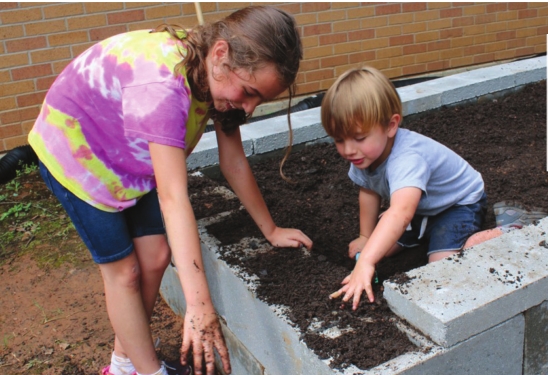Farm to school takes root

The Goldman School and Child Development Center in Highland leads the way with a garden, curriculum and local food in the cafeteria
Our growing regional interest in local, healthy foods extends beyond farmers’ markets to schools and childcare centers. These local efforts are taking root in concert with increasing national attention and supportive policy change at the state level. Just last month the Louisiana Farm to School Program Act was passed, providing essential infrastructural support for every school in Louisiana to develop farm to school programs.
Here in Shreveport, one facility in particular, the Goldman School and Child Development Center, a program of The Arc Caddo-Bossier, is forging an innovative model of healthier foods, support for local farms and a fully inclusive schoolyard garden.
Sam Beech, director of children’s services, explains their approach, “We see our decision to move to healthier foods in our cafeteria and an interactive school garden for our children as natural outgrowth of our mission to provide quality, inclusive child-care and help children grow physically, intellectually and socially.”
Farm to school and school garden initiatives enrich the connection children have with healthy food, while local food producers get an economic boost and schools deepen crossdisciplinary curriculum. In addition, farm to school activities, like taste tests, cooking and gardening offer high-quality learning opportunities and promote lifelong healthy food habits. Whether the focus is on food served in the cafeteria or health education – the effects are profound.
Researchers advising the National Farm to School Network have found a direct association between local food and chronic health outcomes. It is estimated that for each $100 increase in per capita direct farm sales, the county/parish obesity rate declines by 1 percent. That’s a meaningful outcome as the Louisiana Department of Health and Hospitals reports an overwhelming 36 percent of children in Caddo Parish are obese or overweight. These children are facing problems that until recently were only associated with middle age: high cholesterol, heart disease and type 2 diabetes.
And there is significant data connecting poor nutrition with impaired academic learning and psychosocial behavior.
Schools are recognizing the many benefits gardens can provide. As a result, school gardens around town are flourishing, from St. Marks Episcopal School to J.S. Clark Elementary with at least one garden now supplying fresh produce to its cafeteria at Loyola College Prep. But the healthy food and garden initiative at Goldman School is unique.
Goldman School serves an especially vulnerable population and is working to incorporate the three main components of farm to school programming: experiential learning, on-site gardening and local food in the cafeteria.
Goldman School, which cares for babies and children 8 weeks to 5 years old, is a diverse and fully inclusive model of childcare. Nearly half of its children are at-risk for or have developmental disabilities, and approximately 20 percent are low-income children eligible for Early Head Start. The only child-care facility in the state that accepts children with all types of disabilities in fully inclusive classrooms, Goldman School’s central belief is that children with and without disabilities develop a greater appreciation for each other when learning side by side.
So when a parent and staff team formed last year to revamp the school’s menu along healthier guidelines, they knew the need was great. Many of the children in the school are food insecure, meaning their households have limited or uncertain access to healthy, affordable food. The constraints, however, were also great. The non-profit school must follow the state Child Nutrition Program guidelines and operates on a tight budget.
“We set out to find ways to make inexpensive but significant shifts to a low-sugar, low-sodium menu with more whole grains and fresh fruits, recognizing how critical nutrition is to a child’s physical, emotional and social development,” said parent Brooke Conley.
The team worked with a food vendor to transform the menu, largely eliminating high fructose corn syrup and moving where possible from processed foods to whole foods, refined bleached grains to whole grains, and fried foods to baked. As a Phase 2, the group explored opportunities to support local farmers
and bring locally grown food into the cafeteria. The children are now
drinking organic milk from a local dairy, Flowing Hills Creamery, which
resulted in a cost savings for the school, and plans are under way to
buy other local farm products, such as sweet potatoes and blueberries.
This spring the Goldman School received materials and technical assistance from the Northwest Louisiana Master Gardeners to build a school garden. Consistent with the school’s mission, the garden will be accessible to children with disabilities, featuring a 4-foot wheelchair path and wheelchair-accessible gardening tables. Garden curriculum will be developed, and the children will plant, tend and eat the fruits and vegetables they grow.
“We are so excited about our garden,” Beech said. “Not only will it encourage our children to eat more fresh foods, but it will also provide rich educational opportunities for motor skills, socialization, a relationship with nature and even early skills to manage stress.”
While the Goldman School pioneers a healthier cafeteria and educational garden, and the broader environment for farm to school programs gets a little greener, our children’s future has never looked more healthy and bright.
Elizabeth Beauvais is a strategic communications and sustainability consultant. She has advised Fortune 100 companies, nonprofits and multinational development banks on issues ranging from climate change and impact investing to human rights and corporate governance. She is also a writer, specializing in food security and social justice, as well as a parent at the Goldman School. Beauvais can be reached at elizabethbeauvais@ hotmail.com and blogs at https://ebeauvaisblog.wordpress.com.
LEARN MORE:
If you would like to get involved in the development of local farm to school initiatives in our region, e-mail slowfoodnla@gmail.com.
